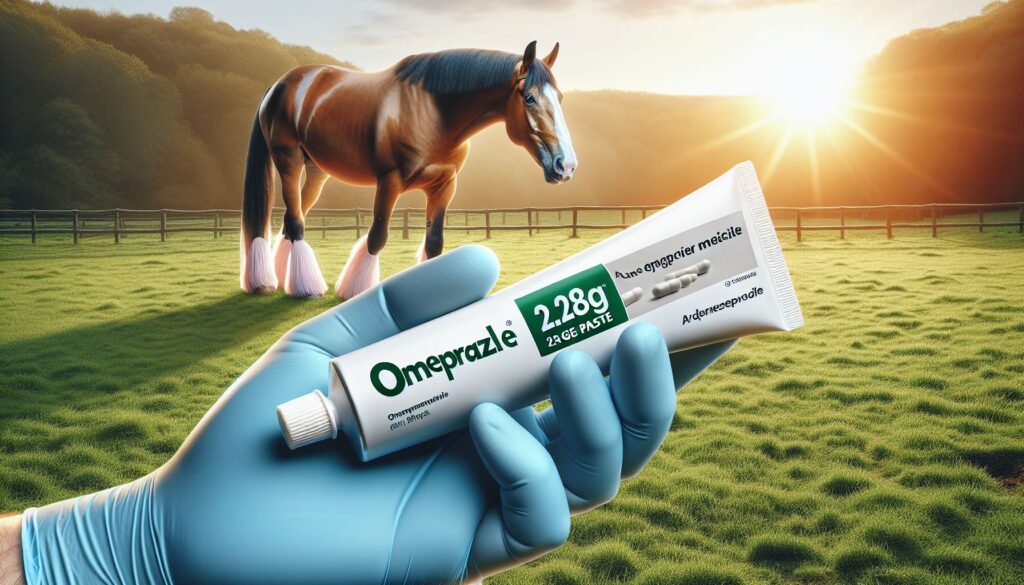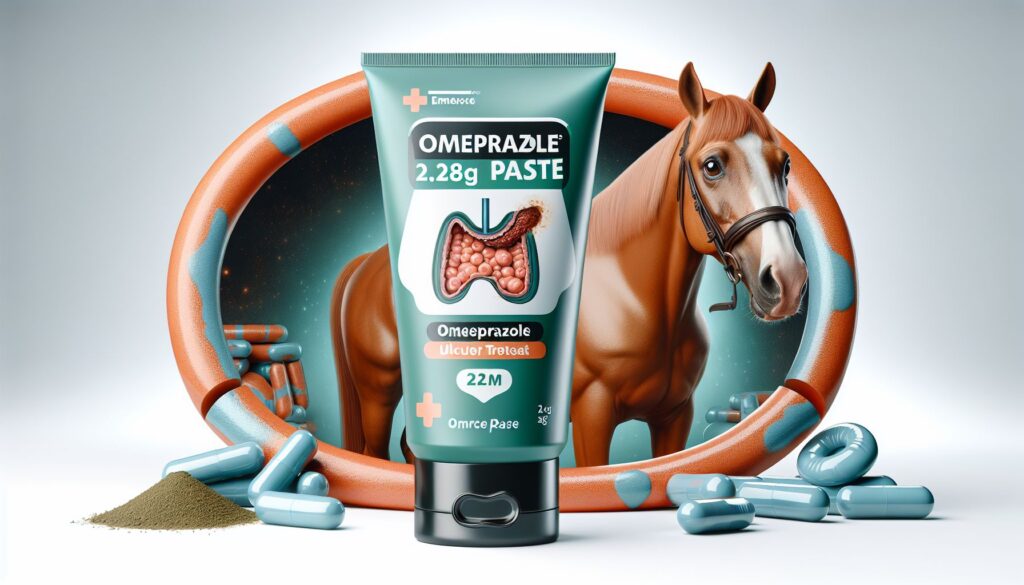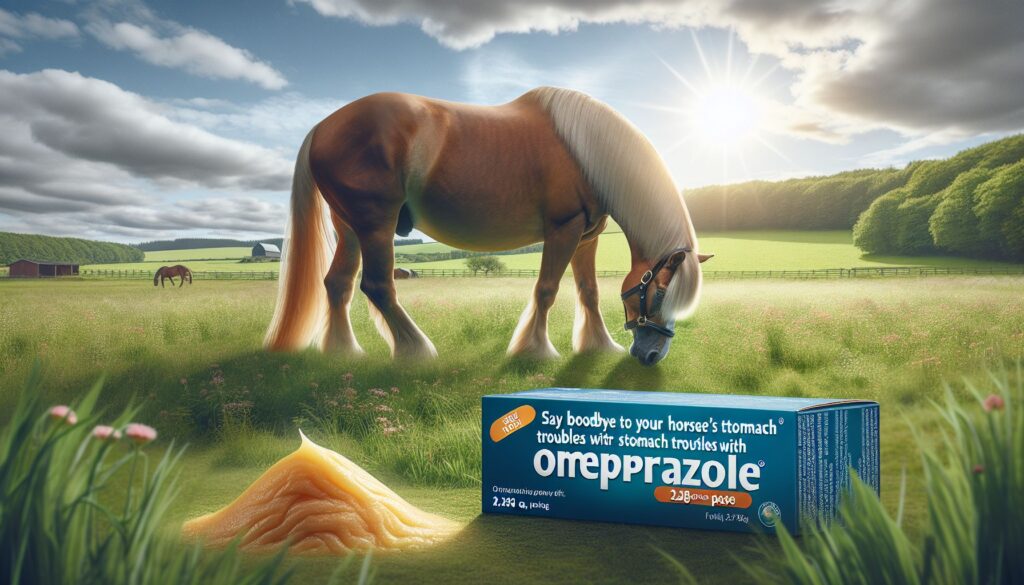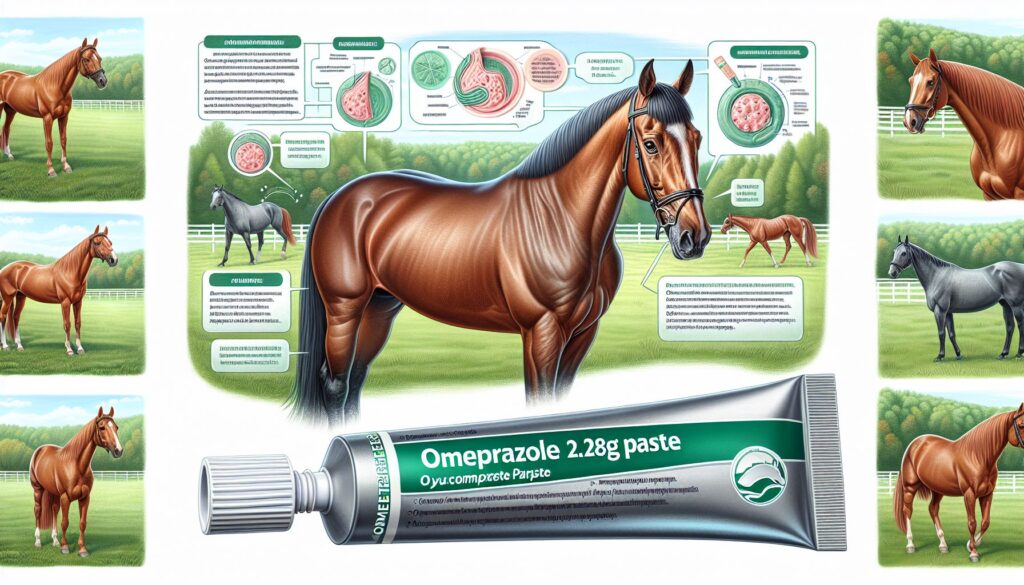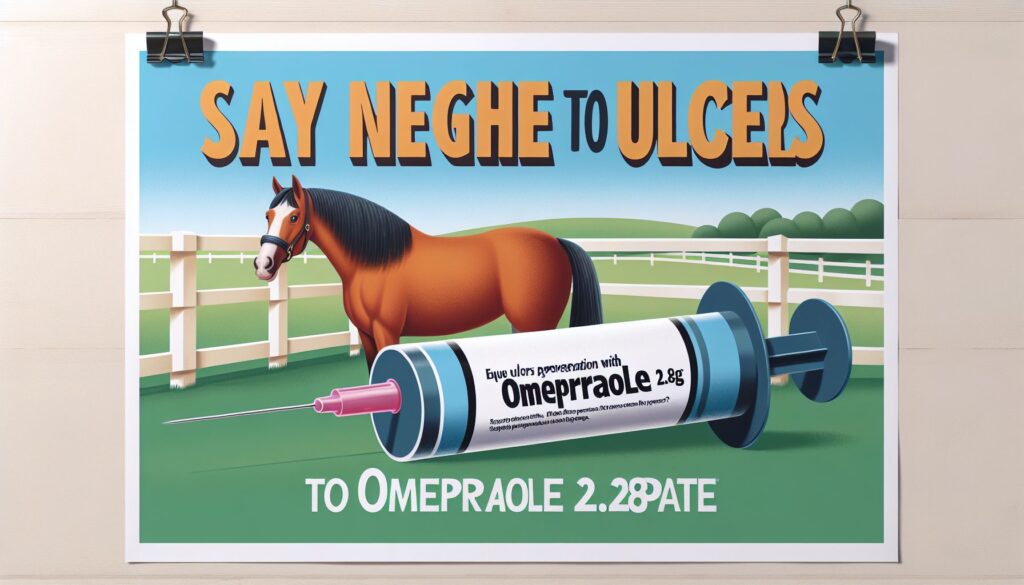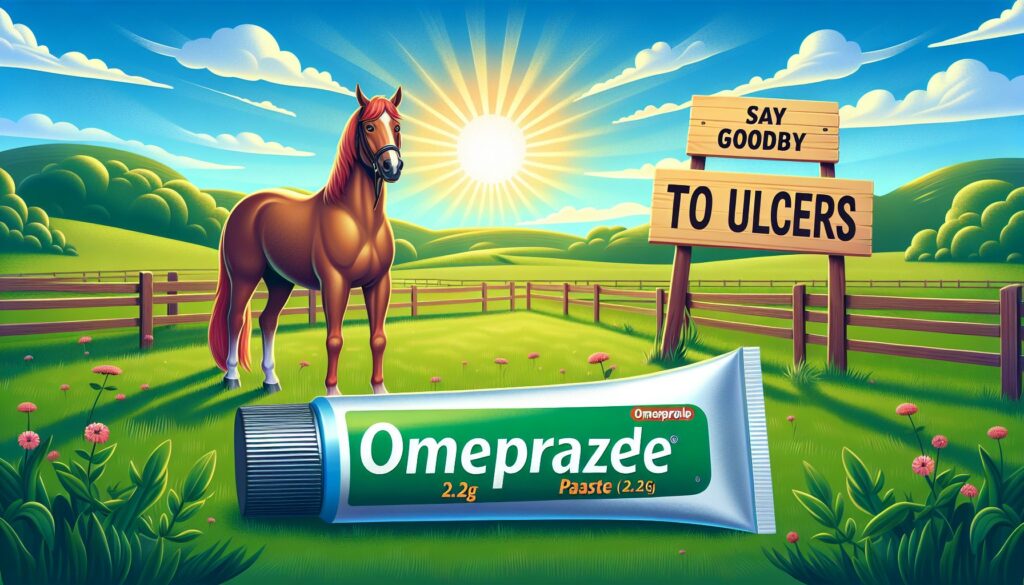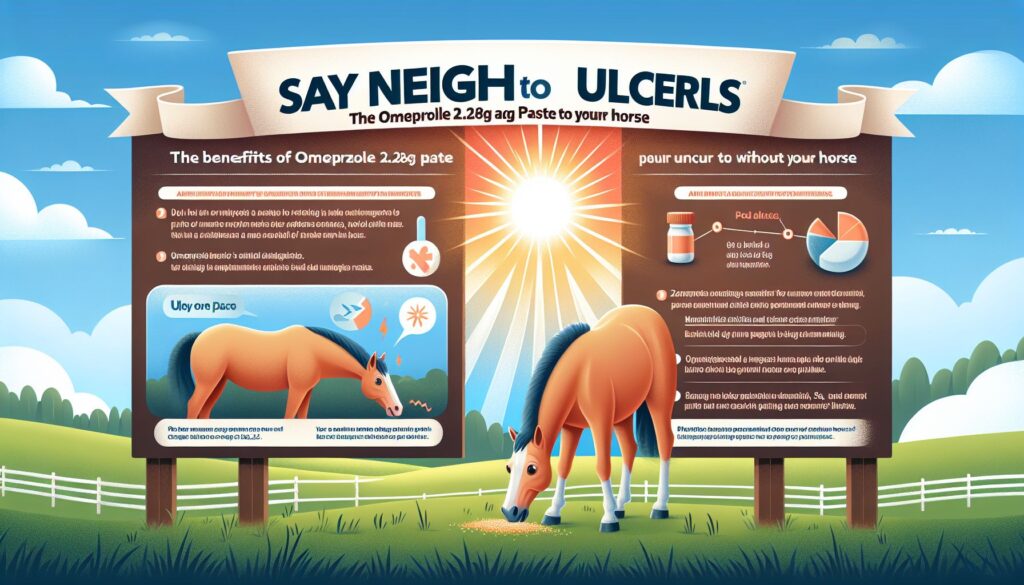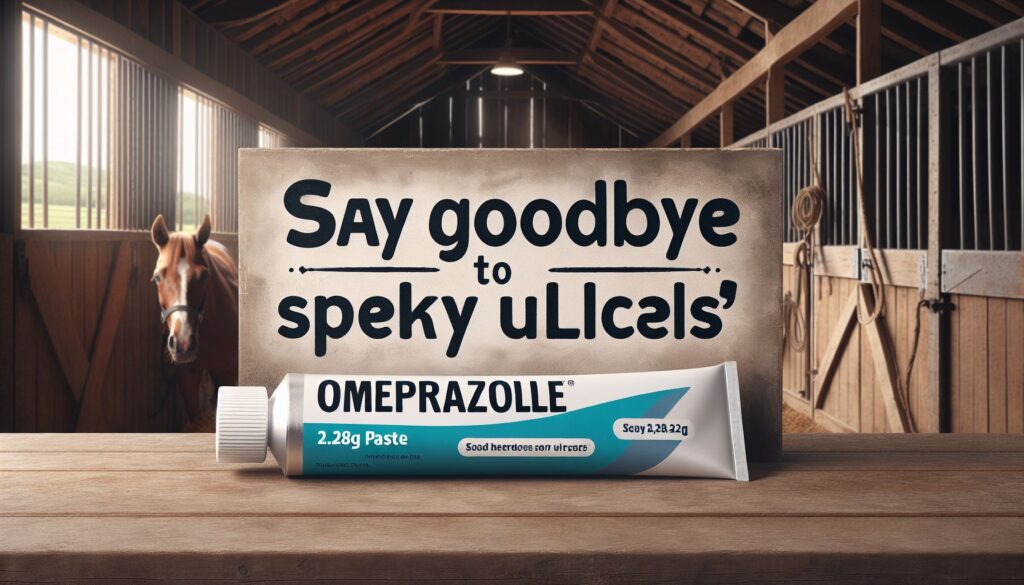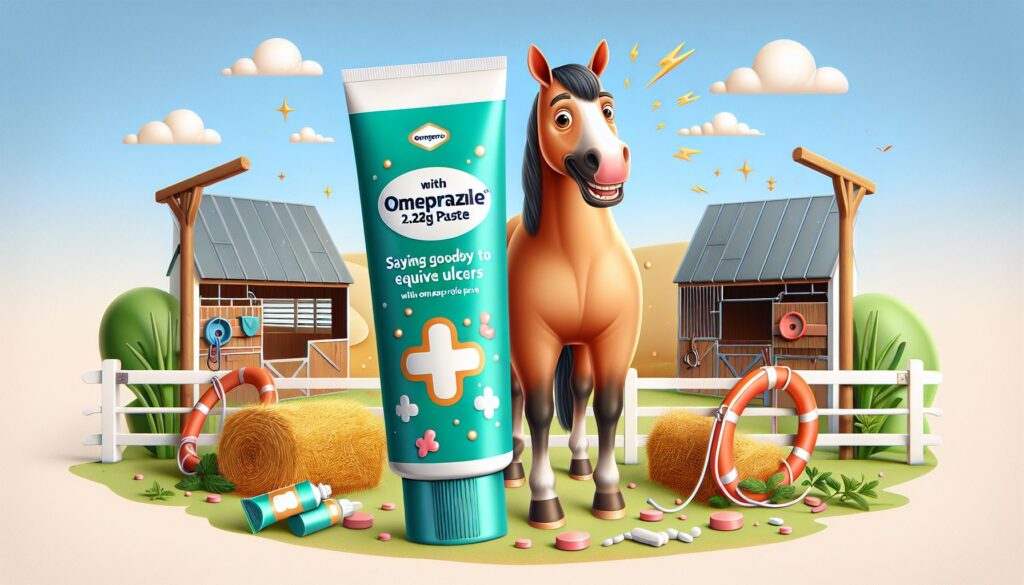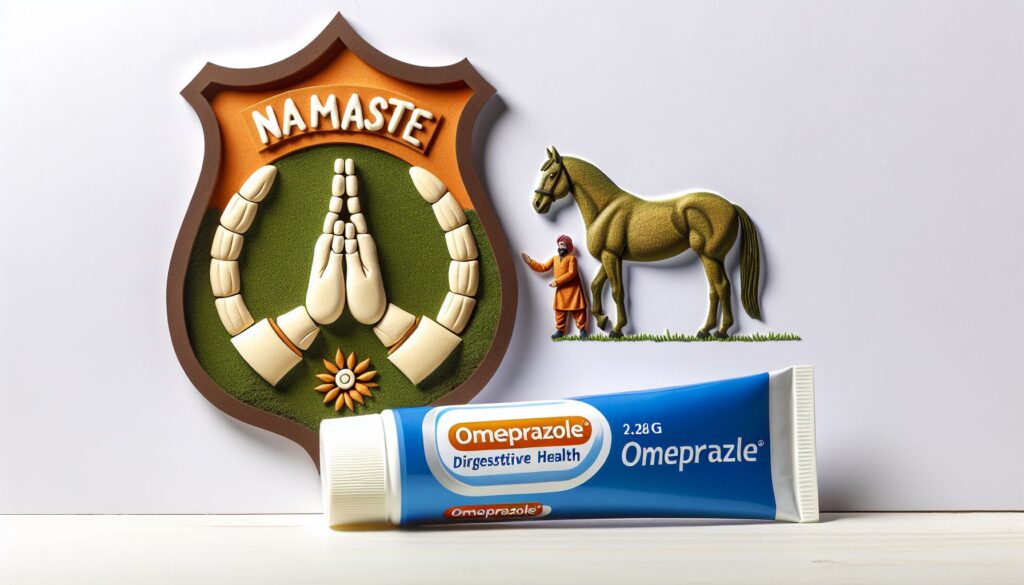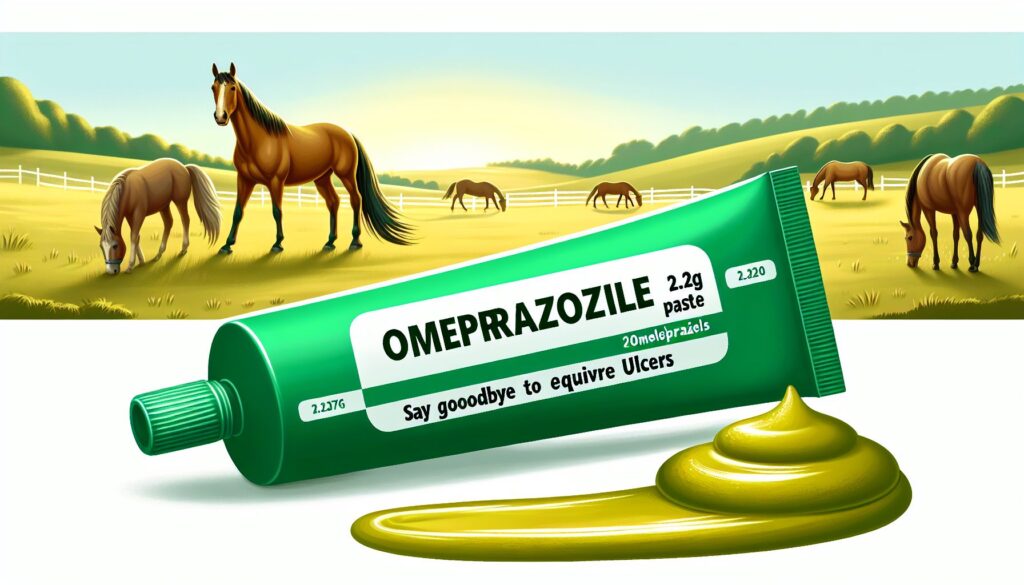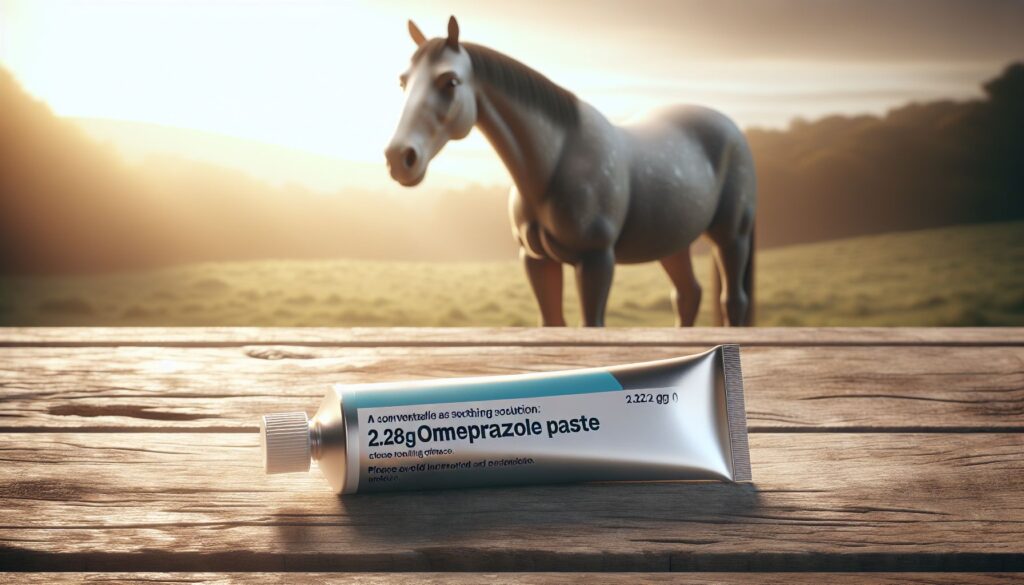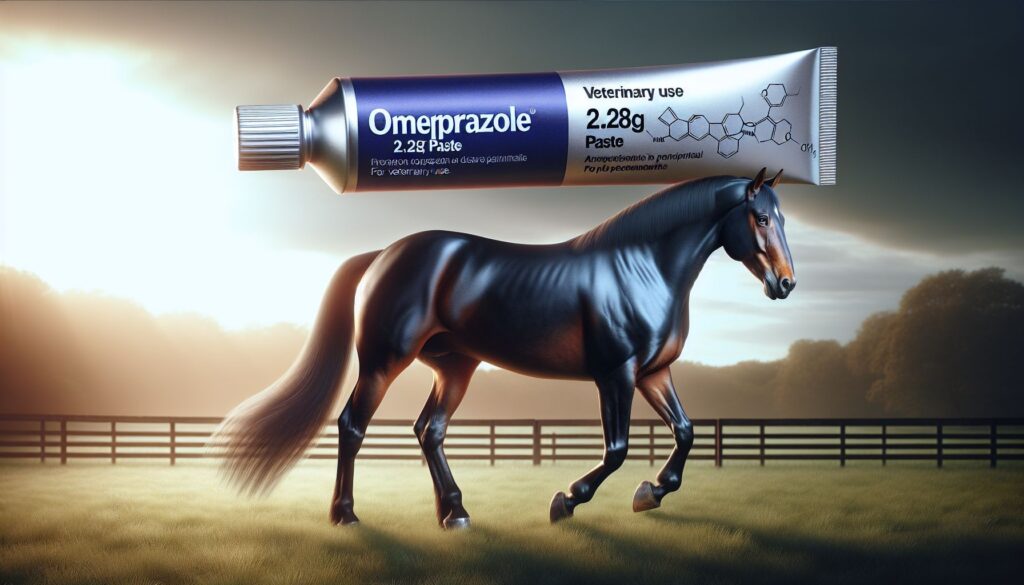- Say Goodbye to EGUS: Why Omeprazole 2.28g Paste is a Game-Changer for Your Horse
If you’re a horse owner, you know how important it is to keep your four-legged friend happy and healthy. From regular exercise to nutritious feed, there are a lot of factors to consider when it comes to maintaining your horse’s well-being. But one issue that often gets overlooked is equine gastric ulcer syndrome (EGUS), a common problem that can affect horses of all breeds, including thoroughbreds.
EGUS occurs when the lining of a horse’s stomach becomes irritated and starts to break down, leading to the formation of ulcers. This condition can cause a range of symptoms, from mild discomfort to severe pain, and can have a significant impact on your horse’s overall health and performance.
Luckily, there is a solution that can help prevent and treat EGUS in horses: Omeprazole 2.28g Paste. This innovative medication is designed to reduce the production of stomach acid, which can help alleviate the symptoms of ulcers and promote healing in the digestive tract.
One of the biggest advantages of Omeprazole 2.28g Paste is its ease of use. Administering medication to horses can be a challenge, but this paste is simple to dose and can be easily mixed with your horse’s feed. This means that you can ensure your horse is getting the proper treatment without any stress or hassle.
In addition, Omeprazole 2.28g Paste is highly effective in treating ulcers in horses. Studies have shown that this medication can help improve the healing of existing ulcers and prevent the formation of new ones. This is especially important for horses that are involved in activities like horse racing, where the stress and intensity of competition can exacerbate the symptoms of EGUS.
For owners of thoroughbred horses, in particular, Omeprazole 2.28g Paste can be a game-changer. Thoroughbreds are known for their speed and agility, but they are also prone to digestive issues like ulcers. By incorporating this medication into their routine, you can help ensure that your horse is in top condition for training and competitions.
It’s important to remember that prevention is key when it comes to managing EGUS in horses. Regularly monitoring your horse’s health and behavior can help you catch any potential issues early on, before they escalate into more serious problems. Incorporating Omeprazole 2.28g Paste into your horse’s healthcare routine can be a proactive step in protecting their digestive health.
In conclusion, Omeprazole 2.28g Paste is a valuable tool for horse owners looking to prevent and treat EGUS in their animals. Its ease of use, effectiveness, and ability to improve the overall health of horses make it a worthwhile investment for any equine enthusiast. Whether you have a thoroughbred competing in horse racing or a beloved family pet, this medication can help keep your horse happy, healthy, and ulcer-free.
- Say “Neigh” to Ulcers: Omeprazole 2.28g Paste for Your Horse
Hey there, all you lovely equestrian enthusiasts! Today, I want to talk to you about something that is near and dear to my heart – our beloved horses’ health. As horse owners, we want nothing but the best for our four-legged companions, and that includes keeping them free from any kind of discomfort or health issues. One common problem that many horses face is Equine Gastric Ulcer Syndrome (EGUS), which can cause quite a bit of pain and discomfort for our equine friends. But fear not, because there is a solution that can help alleviate this issue – Omeprazole 2.28g Paste.
First off, let’s talk a bit about EGUS and why it is such a concern for horse owners, especially those involved in horse racing or with high-performance horses such as Thoroughbreds. EGUS is a condition that occurs when there is damage to the lining of the horse’s stomach, usually caused by an excess of stomach acid. This can lead to ulcers forming in the stomach and can cause a whole host of issues for our horses, from poor performance to weight loss and even behavioral changes.
Now, if you’re anything like me, the thought of our horses suffering from ulcers is enough to make your heart ache. But worry not, because Omeprazole 2.28g Paste is here to help. This paste is a medication that works to reduce the amount of acid produced in the horse’s stomach, helping to prevent and heal ulcers. It is a proven and effective treatment for EGUS, and many horse owners have seen great results after using it for their horses.
One of the great things about Omeprazole 2.28g Paste is how easy it is to administer to your horse. The paste comes in convenient syringes that make it a breeze to give to your horse, whether they are at home or at a competition. No more struggling with pills or powders, just a simple and effective paste that can help keep your horse healthy and happy.
But the benefits of Omeprazole 2.28g Paste don’t stop there. By treating and preventing ulcers in your horse, you can help improve their overall well-being and performance. Horses that are free from the pain and discomfort of ulcers are more likely to thrive and excel in their training and competitions, whether they are racing or participating in other equestrian events. Plus, a healthy horse is a happy horse, and there’s nothing better than seeing our beloved companions thriving and feeling their best.
So, if you’re looking to give your horse the best possible care and support, consider adding Omeprazole 2.28g Paste to their routine. Whether your horse is a competitive racer or a beloved pet, this medication can help keep them healthy and happy for years to come. Say “neigh” to ulcers and give your horse the gift of good health with Omeprazole 2.28g Paste.
In conclusion, our horses deserve nothing but the best when it comes to their health and well-being. By using Omeprazole 2.28g Paste, you can help prevent and treat ulcers in your horse, allowing them to thrive and excel in whatever they do. So why wait? Give your horse the care they deserve and say goodbye to ulcers with Omeprazole 2.28g Paste. Your horse will thank you for it!
- Say Goodbye to Equine Ulcers with Omeprazole 2.28g Paste
As horse owners, we always strive to provide the best care and support for our beloved equine companions. This includes ensuring they are healthy, happy, and free from any discomfort or ailments. One common issue that many horses face, particularly those involved in horse racing like thoroughbreds, is the development of ulcers in the gastrointestinal tract. These ulcers can cause a range of symptoms, from mild discomfort to more severe issues that can impact your horse’s performance and well-being.
Fortunately, there is a solution that can help alleviate and prevent equine ulcers – Omeprazole 2.28g Paste. This powerful medication is specifically designed to target and treat ulcers in horses, providing relief and support for your equine friend.
Equine gastric ulcers syndrome (EGUS) is a common condition that affects horses of all breeds and disciplines, but it is especially prevalent in racehorses like thoroughbreds. The high-stress environment of horse racing can contribute to the development of ulcers, as can other factors such as diet, exercise, and management practices. It’s important for horse owners to be aware of the signs and symptoms of ulcers in horses so they can take action to protect their equine companions.
Symptoms of equine ulcers can vary depending on the severity and location of the ulcers. Some common signs to look out for include:
- Changes in appetite or eating habits
- Weight loss
- Poor coat condition
- Dull or lethargic demeanor
- Behavioral changes, such as irritability or aggression
- Performance issues, such as reluctance to work or under-performance
If you notice any of these symptoms in your horse, it’s important to consult with your veterinarian to determine the best course of action. Omeprazole 2.28g Paste is a highly effective treatment for equine ulcers, as it works to reduce the production of stomach acid and promote healing of the ulcerated tissues.
When administering Omeprazole 2.28g Paste to your horse, it’s important to follow the recommended dosage and administration instructions provided by your veterinarian. This medication is typically given once daily for a specified period of time, depending on the severity of the ulcers and your horse’s individual needs. It’s also important to monitor your horse’s progress and response to the treatment, as some horses may require additional support or adjustments to their treatment plan.
In addition to treating equine ulcers, Omeprazole 2.28g Paste can also be used as a preventative measure for horses at risk of developing ulcers. This is particularly important for racehorses like thoroughbreds, who may be more susceptible to ulcers due to the demands of their training and competition schedules. By proactively managing your horse’s stomach health with Omeprazole 2.28g Paste, you can help prevent the development of ulcers and keep your equine companion happy and healthy.
In conclusion, equine ulcers are a common and potentially serious issue for horses, particularly those involved in horse racing like thoroughbreds. Omeprazole 2.28g Paste is a highly effective treatment and preventative measure for equine ulcers, providing relief and support for your horse’s stomach health. By being proactive about managing and treating equine ulcers, you can help ensure your horse’s well-being and performance for years to come.
Remember to consult with your veterinarian if you suspect your horse may have ulcers or if you have any questions about Omeprazole 2.28g Paste. Your horse’s health and happiness are worth the investment.
- Say Goodbye to Ulcers: The Magic of Omeprazole 2.28g Paste for Your Precious Horses
As horse owners, we all want our beloved companions to be happy, healthy, and thriving. And when it comes to the health of our equine friends, one common but often overlooked issue is ulcers. Studies have shown that up to 90% of performance horses, including thoroughbreds in the racing industry, suffer from gastric ulcers. These ulcers, also known as Equine Gastric Ulcer Syndrome (EGUS), can be extremely painful and detrimental to your horse’s overall well-being. That’s why it’s crucial to take proactive steps to prevent and treat ulcers in our horses, and one powerful solution is Omeprazole 2.28g Paste.
Omeprazole 2.28g Paste is a game-changer when it comes to managing and preventing ulcers in horses. This powerful medication works by reducing the amount of acid produced in the stomach, which helps to heal existing ulcers and prevent new ones from forming. Whether your horse is a high-performance athlete or a beloved companion, Omeprazole 2.28g Paste can make a world of difference in their comfort and quality of life.
One of the most common groups of horses that suffer from ulcers are thoroughbreds in the racing industry. The intense exercise, high-stress environment, and strict feeding schedules can all contribute to the development of gastric ulcers in these elite athletes. For trainers and owners looking to keep their racehorses in top condition, incorporating Omeprazole 2.28g Paste into their routine can be a game-changer. By proactively managing ulcers with this effective medication, thoroughbreds can perform at their best and stay healthy and happy.
But it’s not just racehorses that can benefit from Omeprazole 2.28g Paste. Horses of all breeds and disciplines can be susceptible to ulcers, especially those that are kept in stalls for long periods or have high-stress lifestyles. Whether your horse is a show jumper, dressage star, or beloved trail companion, ulcers can be a silent threat to their well-being. By incorporating Omeprazole 2.28g Paste into their care routine, you can ensure that your horse is comfortable, healthy, and performing at their peak.
So how exactly does Omeprazole 2.28g Paste work its magic? The active ingredient in this medication, omeprazole, is a proton pump inhibitor that blocks the production of stomach acid. This reduction in acid not only helps to heal existing ulcers but also creates a protective barrier in the stomach to prevent new ulcers from forming. This dual-action approach makes Omeprazole 2.28g Paste a highly effective and targeted treatment for gastric ulcers in horses.
When it comes to administering Omeprazole 2.28g Paste to your horse, the process is simple and straightforward. The paste can be easily syringed onto your horse’s tongue or mixed with a small amount of feed for easy consumption. And with once-daily dosing, incorporating Omeprazole 2.28g Paste into your horse’s routine is convenient and hassle-free. Plus, with its palatable apple flavor, most horses will happily gobble up their daily dose without any fuss.
In conclusion, ulcers are a common and often overlooked issue for horses, especially in high-stress and high-performance environments like horse racing. By proactively managing and preventing ulcers with Omeprazole 2.28g Paste, you can ensure that your precious horses are comfortable, healthy, and thriving. Whether your horse is a racehorse, show jumper, or beloved companion, Omeprazole 2.28g Paste is a powerful tool in the fight against gastric ulcers. So say goodbye to ulcers and hello to a happier, healthier horse with the magic of Omeprazole 2.28g Paste.
- Say Goodbye to Ulcers with Omeprazole 2.28g Paste for Your Beloved Thoroughbred
As horse owners, we always want what’s best for our beloved four-legged friends. Whether they are our trusty companions or our prized racing thoroughbreds, their health and well-being are always a top priority. One common issue that many horse owners may face is equine gastric ulcer syndrome (EGUS), which can be a painful and debilitating condition for our horses. But fear not, there is a solution – Omeprazole 2.28g Paste.
Understanding EGUS in Horses
Before we delve into the benefits of Omeprazole 2.28g Paste, let’s take a closer look at what EGUS actually is. Equine gastric ulcer syndrome refers to the erosion of the stomach lining in horses, which can be caused by a variety of factors such as stress, diet, and exercise. Symptoms of EGUS can include poor performance, weight loss, changes in behavior, and even colic. This condition can be particularly prevalent in horses that are involved in activities that require high levels of physical exertion, such as horse racing.
The Impact of Ulcers on Thoroughbreds
Thoroughbreds, in particular, are susceptible to developing ulcers due to the nature of their training and racing schedules. The stress of training, traveling, and competing can all contribute to the development of ulcers in these high-performance horses. As such, it is essential for thoroughbred owners and trainers to be proactive in managing and preventing ulcers in their horses.
The Benefits of Omeprazole 2.28g Paste
Omeprazole 2.28g Paste is a proven and effective treatment for EGUS in horses. This paste works by inhibiting the production of gastric acid in the stomach, which helps to protect the stomach lining from further damage and promotes healing of existing ulcers. With regular use of Omeprazole 2.28g Paste, horse owners can help prevent the development of ulcers and improve the overall gastric health of their horses.
One of the key advantages of Omeprazole 2.28g Paste is its ease of administration. This paste can be easily administered orally to horses and is quickly absorbed into the bloodstream, providing fast and effective relief for horses suffering from ulcers. Additionally, Omeprazole 2.28g Paste has a palatable taste that horses find appealing, making it easier for horse owners to ensure that their horses receive the full dose of medication.
The Importance of Gastric Health in Thoroughbreds
Maintaining good gastric health is essential for thoroughbreds, as ulcers can have a significant impact on their performance and overall well-being. Horses that are suffering from ulcers may experience reduced appetite, weight loss, and decreased athletic performance. By using Omeprazole 2.28g Paste as part of a comprehensive management plan, thoroughbred owners can help ensure that their horses are in optimal health and performance condition.
Incorporating Omeprazole 2.28g Paste into Your Horse’s Wellness Routine
If you are a thoroughbred owner or trainer looking to improve the gastric health of your horses, consider incorporating Omeprazole 2.28g Paste into their wellness routine. This easy-to-use paste can be administered daily to help prevent the development of ulcers and support overall gastric health in your horses. With regular use of Omeprazole 2.28g Paste, you can help ensure that your horses are happy, healthy, and performing at their best.
In conclusion, Omeprazole 2.28g Paste is a valuable tool in the management and prevention of ulcers in horses, particularly in high-performance athletes such as thoroughbreds. By prioritizing the gastric health of your horses and incorporating Omeprazole 2.28g Paste into their daily routine, you can help ensure that they are in optimal condition for training, racing, and competing. Your beloved thoroughbreds deserve the best care possible, so why not give them the gift of good gastric health with Omeprazole 2.28g Paste?
- Say Goodbye to Ulcers: Omeprazole 2.28g Paste for Your Horse
As a horse lover and owner, you know that your horse’s health and well-being are of utmost importance. From providing the best nutrition to ensuring they are comfortable and happy, you do everything in your power to make sure your equine companion is thriving. However, even with the best care, horses, especially those involved in high-performance activities like horse racing, can be prone to a common and painful condition known as equine gastric ulcers syndrome (EGUS).
EGUS is a prevalent issue among horses, particularly in those who are subjected to rigorous training and competition. This condition can cause a range of symptoms, including poor appetite, weight loss, behavioral changes, and performance issues. If left untreated, ulcers can have a significant impact on your horse’s overall health and well-being.
Thankfully, there is a solution that can help your horse combat and prevent ulcers: Omeprazole 2.28g Paste. This medication is specifically formulated to treat and prevent ulcers in horses, providing much-needed relief and support for your equine athlete. Let’s take a closer look at how Omeprazole 2.28g Paste can benefit your horse and why it should be a staple in your equine first aid kit.
The Science Behind Omeprazole 2.28g Paste
Omeprazole is a proton pump inhibitor that works by reducing the production of stomach acid in horses. This is crucial for horses with ulcers, as excess stomach acid can worsen the condition and cause discomfort and pain. By inhibiting acid production, Omeprazole helps to heal existing ulcers and prevent new ones from forming, promoting a healthy gastrointestinal tract and overall well-being for your horse.
Benefits of Omeprazole 2.28g Paste for Horses
There are numerous benefits to using Omeprazole 2.28g Paste for your horse, especially if they are at risk for or currently suffering from ulcers. Here are a few of the key advantages of incorporating this medication into your horse’s care routine:
-
Improved Digestive Health: Omeprazole helps to reduce stomach acid production, allowing ulcers to heal and preventing new ones from forming. This can lead to improved digestive health and comfort for your horse.
-
Enhanced Performance: Horses with ulcers may experience performance issues due to discomfort and pain. By treating and preventing ulcers with Omeprazole, you can help your horse perform at their best without the hindrance of gastrointestinal issues.
-
Overall Well-Being: Ulcers can have a significant impact on your horse’s overall well-being, affecting their appetite, weight, behavior, and performance. Omeprazole can help to alleviate these symptoms and promote a happier, healthier horse.
Using Omeprazole 2.28g Paste in Your Equine Care Routine
Incorporating Omeprazole 2.28g Paste into your horse’s care routine is easy and convenient. Simply administer the recommended dosage as directed by your veterinarian, usually once daily for a set period of time or as needed based on your horse’s specific needs. Omeprazole is safe and effective for use in horses, providing relief and support for those suffering from ulcers.
Conclusion
As a horse owner, you want what’s best for your equine companion, especially when it comes to their health and well-being. Ulcers are a common issue among horses, particularly those involved in high-performance activities like horse racing. If your horse is at risk for or currently suffering from ulcers, Omeprazole 2.28g Paste can be a game-changer in promoting digestive health, performance, and overall well-being.
By incorporating Omeprazole into your equine first aid kit and care routine, you can help your horse combat and prevent ulcers, ensuring they are happy, healthy, and thriving. Say goodbye to ulcers and hello to a healthier, happier horse with Omeprazole 2.28g Paste.
-
- Say goodbye to your horse’s stomach troubles with Omeprazole 2.28g Paste
If your horse is struggling with gastrointestinal issues such as Equine Gastric Ulcer Syndrome (EGUS), you know how frustrating it can be to see your beloved animal in discomfort. As a horse owner, it’s important to take proactive steps to ensure the well-being of your equine companion. That’s where Omeprazole 2.28g Paste comes in.
Omeprazole is a medication that is commonly used to treat ulcers in horses. Ulcers can be a common issue for horses, especially those that are involved in activities such as horse racing. The stress and intense training that thoroughbreds go through can often lead to the development of ulcers, causing discomfort and affecting their performance. With Omeprazole 2.28g Paste, you can help your horse find relief and get back to feeling their best.
One of the key benefits of Omeprazole 2.28g Paste is its ease of use. Administering medication to horses can be a challenge, but with this paste, you can simply mix it into your horse’s feed for a hassle-free way to ensure they get the treatment they need. No more struggling to get your horse to take their medication – Omeprazole paste makes the process simple and stress-free for both you and your equine friend.
In addition to its convenience, Omeprazole 2.28g Paste is also highly effective at treating ulcers in horses. The active ingredient, omeprazole, works to reduce the production of stomach acid, helping to heal existing ulcers and prevent new ones from forming. This means that your horse can experience relief from their symptoms and get back to their usual self in no time.
When it comes to caring for your horse, their health and well-being should always be a top priority. Ensuring that they receive the necessary treatment for any health issues, such as ulcers, is essential for their overall happiness and performance. With Omeprazole 2.28g Paste, you can take proactive steps to address any gastrointestinal issues your horse may be experiencing, allowing them to feel comfortable and thrive.
Whether your horse is a beloved companion or a competitive racer, their health is paramount. By incorporating Omeprazole 2.28g Paste into their routine, you can provide them with the relief they need to overcome ulcers and continue to perform at their best. Don’t let gastrointestinal issues hold your horse back – give them the support they need with Omeprazole paste.
In conclusion, Omeprazole 2.28g Paste is a valuable tool in the treatment of ulcers in horses, offering a convenient and effective solution for gastrointestinal issues such as EGUS. With its easy administration and proven results, this paste is a must-have for any horse owner looking to improve their horse’s health and well-being. Don’t let ulcers stand in the way of your horse’s success – try Omeprazole 2.28g Paste today and help your equine companion feel their best.
- Keeping Your Thoroughbred Healthy: A Look at Omeprazole 2.28g Paste for Horses
As a proud owner of a beautiful and majestic thoroughbred, you understand the importance of keeping your horse healthy and happy. From regular exercise to proper nutrition, there are many factors to consider when caring for your equine companion. One common issue that can affect horses, especially those involved in horse racing, is equine gastric ulcers syndrome (EGUS). These painful ulcers can have a negative impact on your horse’s performance and overall well-being. Luckily, there is a solution that can help alleviate this condition and keep your horse feeling their best – Omeprazole 2.28g Paste.
Omeprazole 2.28g Paste is a medication specifically designed to treat and prevent gastric ulcers in horses. It works by reducing the production of acid in the stomach, which can help to heal existing ulcers and prevent new ones from forming. This can be especially beneficial for horses engaged in high-intensity activities like horse racing, where the stress and intensity of competition can exacerbate the risk of ulcers.
If you’re a thoroughbred owner who is serious about your horse’s health and performance, incorporating Omeprazole 2.28g Paste into your horse’s regimen can make a significant difference. Here are a few reasons why this medication may be a good choice for your horse:
-
Effective Treatment: Omeprazole has been proven to be highly effective in treating gastric ulcers in horses. Studies have shown that horses treated with Omeprazole experience improved ulcer healing and reduced recurrence rates. By using Omeprazole 2.28g Paste, you can help ensure that your horse’s ulcers are properly managed.
-
Easy to Administer: Omeprazole 2.28g Paste is easy to administer, making it a convenient option for busy horse owners. The paste can be given orally, either directly into the horse’s mouth or mixed with feed. This means that you can easily incorporate it into your horse’s daily routine without causing undue stress or hassle.
-
Trusted by Professionals: Omeprazole 2.28g Paste is a trusted medication used by many horse racing professionals and veterinarians. Its efficacy and safety make it a popular choice among those who are dedicated to keeping their horses in top condition.
-
Improved Performance: By treating and preventing gastric ulcers, Omeprazole can help improve your horse’s overall performance. Horses with ulcers may experience discomfort and decreased appetite, which can negatively impact their training and competition. With Omeprazole 2.28g Paste, you can help your horse feel their best and perform at their peak.
In conclusion, Omeprazole 2.28g Paste is a valuable tool in the care and maintenance of your thoroughbred horse. By addressing the issue of gastric ulcers, you can help ensure that your horse remains healthy, happy, and ready to perform at their best. So why wait? Consider adding Omeprazole 2.28g Paste to your horse’s regimen and give them the support they need to thrive.
-
- #Say Neigh to Equine Ulcers with Omeprazole 2.28g Paste
Hello fellow horse lovers! Today, I want to talk about a common issue that many of our beloved equine friends face: ulcers. As horse owners, we always want the best for our animals, whether they’re pets, companions, or even competitors on the horse racing circuit. That’s why it’s essential to be aware of the signs and symptoms of ulcers in horses and how we can effectively treat and prevent them. One of the most popular and effective treatments on the market is Omeprazole 2.28g Paste.
Ulcers can be a serious problem for horses, especially those involved in high-stress activities like horse racing. Thoroughbreds, in particular, are often at risk due to the demanding nature of their training and competition schedules. The term Equine Gastric Ulcer Syndrome (EGUS) refers to the erosion of the stomach lining in horses, which can lead to discomfort, poor performance, and even more severe health issues if left untreated.
So why is Omeprazole 2.28g Paste such a game-changer when it comes to treating ulcers in horses? Well, Omeprazole is a proton pump inhibitor that works by decreasing the amount of acid produced in the stomach. This reduction in acid helps to heal and prevent ulcers from forming, providing relief and comfort for our four-legged friends.
Administering Omeprazole 2.28g Paste is easy and convenient. The paste can be easily administered orally to your horse, either directly from the syringe or mixed with a small amount of feed. The precise dosage recommendation will depend on your horse’s weight and the severity of their ulcers, so it’s always best to consult with your veterinarian before starting any treatment regimen.
In addition to its effectiveness in treating existing ulcers, Omeprazole 2.28g Paste can also be used as a preventative measure for horses at risk of developing ulcers. By incorporating Omeprazole into your horse’s routine, especially during stressful periods such as training or competition, you can help ensure their gastric health and overall well-being.
As horse owners, we have a responsibility to prioritize the health and happiness of our equine companions. Ulcers can be a significant source of discomfort for horses, impacting their performance and quality of life. By being proactive in recognizing the signs of ulcers and implementing a treatment plan that includes Omeprazole 2.28g Paste, we can help our horses thrive and excel in their respective pursuits.
In conclusion, Omeprazole 2.28g Paste is a valuable tool in the fight against ulcers in horses. Whether your horse is a beloved pet, a trusted companion, or a competitive racer, their gastric health should always be a top priority. By utilizing Omeprazole as part of their wellness routine, you’re taking a proactive step towards ensuring their comfort and longevity. So say neigh to equine ulcers and say yes to Omeprazole 2.28g Paste for your horse’s well-being. Here’s to happy, healthy horses!
PS: Don’t forget to consult with your veterinarian before starting any new treatment regimen for your horse. Your vet will be able to provide personalized guidance and recommendations based on your horse’s individual needs and circumstances.
- Say goodbye to equine gastric ulcers with Omeprazole 2.28g Paste
As horse enthusiasts and owners, we all want our beloved animals to be healthy and happy. Whether they are our companions for leisurely rides or our partners in competitive horse racing, we always strive to provide them with the best care possible. However, one common ailment that often goes undetected in horses is equine gastric ulcers (EGUs). EGUs can cause discomfort, poor performance, and even more serious health issues if left untreated. That’s why it’s essential to be proactive in preventing and treating ulcers in our horses.
One effective solution for treating EGUs in horses is Omeprazole 2.28g Paste. This paste is specifically formulated to help alleviate the symptoms of ulcers and promote healing in the digestive tract. Omeprazole works by reducing the amount of acid produced in the stomach, which helps to protect the sensitive lining of the stomach and prevent further damage.
Ulcers are a common issue in horses, particularly in high-stress situations like horse racing. Thoroughbreds, in particular, are prone to developing ulcers due to the intense training and competitive environment they are often subjected to. These elite athletes can experience significant performance issues if ulcers are not properly addressed. Omeprazole 2.28g Paste can be a game-changer for these horses, allowing them to perform at their best and stay healthy and competitive.
When it comes to treating ulcers in horses, prevention is key. By incorporating Omeprazole 2.28g Paste into your horse’s routine, you can help prevent the development of ulcers and maintain their overall digestive health. This paste is easy to administer and is well-tolerated by most horses, making it a convenient solution for busy horse owners and trainers.
In addition to its effectiveness in treating ulcers, Omeprazole 2.28g Paste is also a cost-effective option for horse owners. With regular use, you can help prevent costly veterinary bills and ensure that your horse stays healthy and happy for years to come. Investing in your horse’s digestive health now can save you time and money down the road.
It’s important to remember that ulcers can affect horses of all ages and disciplines, not just high-performance athletes. Even pleasure horses and retirees can develop ulcers due to various factors like diet, stress, and environmental changes. By being proactive and incorporating Omeprazole 2.28g Paste into your horse’s care routine, you can help ensure that they stay happy and healthy, no matter their lifestyle.
In conclusion, Omeprazole 2.28g Paste is a valuable tool in the prevention and treatment of equine gastric ulcers in horses of all ages and disciplines. Whether your horse is a competitive racer or a leisurely companion, they can benefit from the digestive support that Omeprazole provides. Investing in your horse’s health now can lead to a happier and healthier life for them in the long run. So say goodbye to ulcers and hello to a happier, healthier horse with Omeprazole 2.28g Paste.
- Say Goodbye to Ulcers: Omeprazole 2.28g Paste for Your Horse
As a horse lover and owner, you want to ensure that your beloved equine friend is healthy and happy. One common issue that many horse owners face is equine gastric ulcers, also known as EGUS. These ulcers can cause discomfort and pain for your horse, affecting their overall well-being and performance, especially in competitive events like horse racing.
If you have a horse that is prone to ulcers or is showing symptoms of EGUS, it’s crucial to take action to address the issue promptly. One highly effective solution that many horse owners and trainers swear by is Omeprazole 2.28g Paste. This innovative product has been shown to effectively treat and prevent ulcers in horses, allowing them to feel their best and perform at their peak.
Understanding EGUS and Its Impact on Your Horse
Equine gastric ulcers are a common issue among horses, particularly in high-stress environments like horse racing. These ulcers can develop in the delicate lining of your horse’s stomach, causing pain, discomfort, and potentially impacting their overall health and performance. Horses with ulcers may exhibit symptoms such as poor appetite, weight loss, changes in behavior, and poor performance.
For horse owners who are passionate about their animals and want to ensure their well-being, addressing and treating ulcers is essential. By understanding the causes of EGUS and taking proactive steps to manage and prevent them, you can help your horse feel their best and achieve their full potential.
The Benefits of Omeprazole 2.28g Paste for Your Horse
Omeprazole 2.28g Paste is a revolutionary product that has been specifically formulated to treat and prevent gastric ulcers in horses. This paste contains the active ingredient omeprazole, which works to inhibit acid production in the stomach, reducing the risk of ulcers developing and promoting healing in existing ulcers.
One of the key benefits of Omeprazole 2.28g Paste is its ease of administration. This paste can be conveniently administered orally to your horse, making it a simple and stress-free solution for ulcer treatment and prevention. Whether you have a high-performance horse competing in horse racing or a beloved companion in need of relief, Omeprazole 2.28g Paste can help improve their quality of life and overall well-being.
Providing Your Thoroughbred with the Care They Deserve
If you have a thoroughbred horse that is involved in competitive events like horse racing, you understand the importance of providing them with the best possible care. Thoroughbreds are known for their athleticism and competitive spirit, but they are also susceptible to the stress and pressures of racing, which can increase their risk of developing ulcers.
By incorporating Omeprazole 2.28g Paste into your thoroughbred’s care routine, you can help protect them from the damaging effects of ulcers and support their performance and well-being. Whether you are a professional trainer or a dedicated horse owner, investing in your horse’s health with Omeprazole 2.28g Paste can make a world of difference in their quality of life and success on the track.
Conclusion
As a horse owner, caring for your beloved equine companion is a top priority. When it comes to managing and preventing gastric ulcers in horses, Omeprazole 2.28g Paste offers a simple yet effective solution. By incorporating this innovative product into your horse’s care routine, you can help protect them from the discomfort and pain of ulcers and support their overall health and performance.
Whether you have a horse that competes in high-stress events like horse racing or simply want to ensure their well-being, Omeprazole 2.28g Paste is a valuable tool in your equine care arsenal. Say goodbye to ulcers and give your horse the care and support they deserve with Omeprazole 2.28g Paste.
- Say Neigh to Ulcers: The Benefits of Omeprazole 2.28g Paste for Your Horse
As equestrians, we all want the best for our beloved horses. We spend hours grooming them, training them, and ensuring they receive the best possible care. But there is one common issue that many horse owners overlook – ulcers. Equine Gastric Ulcer Syndrome (EGUS) is a prevalent problem in horses, especially in high-stress situations such as horse racing. Luckily, there is a solution that can help prevent and treat ulcers in horses – Omeprazole 2.28g Paste.
Omeprazole is a proton pump inhibitor that works by reducing the amount of acid produced in the stomach. This can help alleviate the pain and discomfort associated with ulcers, as well as promote healing of the affected tissues. In the world of horse racing, where the pressure to perform is high, Omeprazole can be a game-changer for maintaining the health and well-being of your thoroughbreds.
Ulcers are a common issue in horses, with studies showing that up to 90% of racehorses may have ulcers. The stress of training, traveling, and competing can all contribute to the development of ulcers in horses. Symptoms of ulcers can vary, but common signs include changes in behavior, poor appetite, weight loss, and a dull coat. If left untreated, ulcers can lead to more serious health problems and affect your horse’s performance on the track.
Omeprazole 2.28g Paste is a convenient and effective treatment option for ulcers in horses. The paste formulation makes it easy to administer to your horse, and the high dose ensures that your horse receives the full benefits of the medication. Omeprazole works by inhibiting the proton pump in the stomach, which helps to reduce the production of acid and create a more favorable environment for healing.
For racehorses, the benefits of Omeprazole 2.28g Paste are particularly significant. Ulcers can impact a horse’s performance on the track, leading to decreased energy levels, poor stamina, and a decreased willingness to train and compete. By treating ulcers with Omeprazole, you can help your horse feel better and perform at their best.
In addition to its efficacy in treating ulcers, Omeprazole 2.28g Paste is also an excellent preventative option for horses at risk of developing ulcers. If you have a high-stress horse, such as a racehorse, or a horse that has a history of ulcers, Omeprazole can help keep ulcers at bay and maintain your horse’s overall health and well-being.
As horse owners, it’s our responsibility to ensure that our equine companions receive the best care possible. By incorporating Omeprazole 2.28g Paste into your horse’s routine, you can help prevent and treat ulcers, improve their quality of life, and support their performance on the track. So say neigh to ulcers and give your horse the care they deserve with Omeprazole 2.28g Paste.
- Say goodbye to pesky ulcers with Omeprazole 2.28g Paste for horses
Do you have a horse that is suffering from gastric ulcers? Have you noticed changes in their behavior, such as decreased appetite, weight loss, and poor performance? If so, you are not alone. Gastric ulcers are a common problem among horses, especially among those involved in activities such as horse racing. But fear not, there is a solution – Omeprazole 2.28g Paste.
Omeprazole 2.28g Paste is a medication specifically formulated for horses to treat and prevent gastric ulcers. It works by reducing the amount of acid produced in the stomach, allowing the ulcers to heal and preventing new ones from forming. This paste is easy to administer and has been proven effective in treating equine gastric ulcers syndrome (EGUS) in horses of all breeds.
Horses involved in high-intensity activities such as horse racing are particularly prone to developing ulcers due to the stress and diet changes that come with their training regimens. Thoroughbreds, in particular, are at a higher risk for ulcers, as they have sensitive stomachs and are more prone to stress-related issues. That’s where Omeprazole 2.28g Paste comes in – it provides fast relief and long-lasting protection against ulcers, allowing your horse to perform at their best.
Not only does Omeprazole 2.28g Paste help treat existing ulcers, but it also serves as a preventative measure. By including this paste in your horse’s daily routine, you can reduce the risk of ulcers developing in the first place. This is especially important for horses who are regularly exposed to stressors such as traveling, competition, and changes in routine.
In addition to its effectiveness in treating and preventing ulcers, Omeprazole 2.28g Paste is also easy to administer. Simply squeeze the appropriate amount onto your horse’s feed once a day, and watch as their symptoms improve over time. With its palatable flavor, most horses will willingly consume the paste without any fuss, making it a hassle-free solution for ulcer management.
So, if you have a horse that is showing signs of gastric ulcers, don’t wait any longer. Invest in Omeprazole 2.28g Paste and give your equine companion the relief they deserve. Watch as they regain their appetite, energy, and performance level, allowing them to excel in whatever activity they pursue, whether it’s horse racing or simply enjoying a leisurely ride in the countryside.
In conclusion, Omeprazole 2.28g Paste is a game-changer for horses suffering from gastric ulcers. Its effectiveness in treating and preventing ulcers, ease of administration, and palatable flavor make it a must-have for any horse owner. So don’t let ulcers hold your horse back any longer – try Omeprazole 2.28g Paste today and see the difference it can make in your horse’s health and happiness.
- Say Goodbye to Equine Ulcers with Omeprazole 2.28g Paste
Hey fellow horse lovers! If you’re like me, you probably spend countless hours caring for and bonding with your precious four-legged friends. And if you have a horse that participates in strenuous activities like horse racing, you know how important it is to keep them in peak condition. One common issue that many horse owners face is Equine Gastric Ulcer Syndrome (EGUS), which can greatly impact your horse’s performance and overall well-being. But fear not, because there’s a solution that can help – Omeprazole 2.28g Paste.
Let me take you on a journey to discover the wonders of this amazing product and how it can help keep your horses happy and healthy.
Understanding Equine Ulcers
First things first, let’s talk about what exactly equine ulcers are and how they can impact your horse. Equine Gastric Ulcer Syndrome (EGUS) is a common condition that affects horses of all breeds, ages, and disciplines. It occurs when there is an imbalance between the protective mucosal lining of the horse’s stomach and the acidic digestive juices it produces. This imbalance can lead to the development of ulcers in the stomach and can cause a range of symptoms including poor appetite, weight loss, colic, and behavioral changes.
For horses that participate in high-intensity activities like horse racing, the risk of developing ulcers is even higher due to the stress and pressure they experience. That’s why it’s crucial for horse owners and trainers to be proactive in preventing and treating ulcers in their equine athletes.
Enter Omeprazole 2.28g Paste
Omeprazole 2.28g Paste is a powerful medication that works to inhibit the production of stomach acid in horses, allowing the ulcers to heal and preventing new ones from forming. This paste is specially formulated for horses and is easy to administer, making it a convenient option for busy horse owners and trainers. Plus, it has been proven to be highly effective in treating and preventing ulcers in horses, especially those that are involved in activities like horse racing.
One of the great things about Omeprazole 2.28g Paste is that it can be given to horses both as a treatment for existing ulcers and as a preventative measure for horses at risk of developing them. This versatility makes it a valuable tool for maintaining your horse’s digestive health and overall well-being. After all, a healthy horse is a happy horse!
The Benefits for Thoroughbreds
For owners and trainers of thoroughbred horses, the benefits of using Omeprazole 2.28g Paste are particularly significant. Thoroughbreds are known for their high-strung nature and intense training regimens, which can put them at a greater risk for developing ulcers. By incorporating Omeprazole 2.28g Paste into their care routine, you can help ensure that your horses are able to perform at their best without being hindered by the discomfort of ulcers.
Whether you have a seasoned racehorse or a young prospect with a promising future, Omeprazole 2.28g Paste can help support their gastrointestinal health and keep them feeling their best. So why wait until ulcers become a problem? Start incorporating this amazing product into your horse’s care routine today and give them the gift of a happy, healthy stomach.
In Conclusion
As horse owners and enthusiasts, we all want what’s best for our beloved equine companions. By being proactive in preventing and treating equine ulcers with products like Omeprazole 2.28g Paste, we can help ensure that our horses are able to thrive and succeed in their chosen disciplines. So don’t let ulcers hold your horse back – give them the care and attention they deserve with the help of Omeprazole 2.28g Paste. Your horse will thank you for it!
- Namaste to your Horse’s Digestive Health: Omeprazole 2.28g Paste
As a horse owner, you understand the importance of keeping your equine friend healthy and happy. One common issue that many horses face is Equine Gastric Ulcer Syndrome (EGUS), which can lead to discomfort and performance issues. If you have a horse involved in activities like horse racing or if you own a high-strung Thoroughbred, you may be particularly concerned about preventing and treating ulcers. That’s where Omeprazole 2.28g Paste comes in.
Understanding EGUS and Ulcers in Horses
EGUS is a condition where ulcers develop in a horse’s stomach lining, usually as a result of prolonged exposure to gastric acid. This can be caused by factors such as stress, diet, and the natural anatomy of the horse’s digestive system. Horses with ulcers may exhibit symptoms such as poor appetite, weight loss, colic, and a change in behavior.
For horses involved in activities like horse racing, the risk of developing ulcers is even higher due to the intense training and competition schedule. Thoroughbreds, in particular, are known to be prone to ulcers because of their sensitive nature and high-stress levels.
The Role of Omeprazole 2.28g Paste in Treating and Preventing Ulcers
Omeprazole is a medication that belongs to a class of drugs known as proton pump inhibitors. It works by reducing the amount of acid produced in the stomach, which helps to heal existing ulcers and prevent further damage. Omeprazole 2.28g Paste is specifically formulated for horses and is easy to administer orally.
When it comes to treating ulcers in horses, Omeprazole 2.28g Paste is considered to be one of the most effective options available. It can provide relief for horses suffering from EGUS and help them to recover more quickly. Additionally, using Omeprazole preventatively can help to reduce the risk of ulcers developing in the first place, especially for horses that are prone to them.
Incorporating Omeprazole 2.28g Paste into Your Horse’s Routine
If you suspect that your horse may be suffering from ulcers, it’s important to consult with your veterinarian to develop a treatment plan. Omeprazole 2.28g Paste is typically given once a day for a specified period of time, depending on the severity of the ulcers and the horse’s response to the medication.
Many horse owners have found success in using Omeprazole as part of their horse’s overall wellness routine, especially for horses that are at a higher risk for developing ulcers. By incorporating Omeprazole into your horse’s care regimen, you can help to ensure that they are comfortable, healthy, and able to perform at their best.
Conclusion
As a horse owner, your top priority is the health and well-being of your equine companion. When it comes to preventing and treating ulcers, Omeprazole 2.28g Paste can be a valuable tool in your toolkit. Whether your horse is a high-performance athlete or a beloved pet, providing them with the care they need to maintain good digestive health is essential.
By investing in products like Omeprazole 2.28g Paste and working closely with your veterinarian, you can help to keep your horse happy, healthy, and free from the discomfort of EGUS. So, give your horse the gift of good digestive health with Omeprazole 2.28g Paste and enjoy many more happy and active years together.
- Say Goodbye to Equine Ulcers with Omeprazole 2.28g Paste for Horses
As horse lovers, we all want our four-legged friends to be happy and healthy. However, one health issue that is all too common among horses, especially those involved in high-intensity activities like horse racing, is equine gastric ulcers syndrome (EGUS). These painful ulcers can cause discomfort and decreased performance in our beloved horses. Fortunately, there is a solution that can help alleviate these symptoms and promote healing – Omeprazole 2.28g Paste.
If you’re a horse owner looking to give your thoroughbred the best possible care, read on to learn more about Omeprazole 2.28g Paste and how it can benefit your horse’s health.
Understanding Equine Ulcers
Equine gastric ulcers are a common issue that affects horses of all breeds and disciplines. They are caused by a breakdown in the protective lining of the stomach, allowing stomach acid to come into contact with the sensitive stomach tissue. This can lead to pain, discomfort, and a host of symptoms such as poor appetite, weight loss, behavioral changes, and decreased performance.
For horses involved in activities like horse racing, the risk of developing ulcers is even higher due to the intense training and lifestyle they lead. The stress of competition, travel, and frequent feeding can all contribute to the development of ulcers in these high-performance horses.
The Role of Omeprazole 2.28g Paste
Omeprazole 2.28g Paste is a medication that belongs to a class of drugs known as proton pump inhibitors. It works by reducing the production of stomach acid, which helps to create a more favorable environment for healing and prevents further damage to the stomach lining.
This paste formulation is specifically designed for horses, making it easy to administer and ensuring that your horse gets the right dose every time. It is a safe and effective way to treat and prevent equine ulcers, allowing your horse to feel more comfortable and perform at their best.
Benefits of Omeprazole 2.28g Paste
There are several benefits to using Omeprazole 2.28g Paste for your horse. Here are just a few:
- Effective Treatment: Omeprazole is a proven treatment for equine ulcers, with many horse owners seeing a noticeable improvement in their horse’s condition after starting treatment.
- Convenient Administration: The paste formulation makes it easy to administer the medication to your horse, ensuring they get the right dose every time.
- Preventative Care: Omeprazole can also be used as a preventative measure to help reduce the risk of ulcers in horses that are at higher risk, such as those involved in intense training and competition.
- Improved Performance: By treating ulcers and reducing stomach acid production, Omeprazole can help your horse feel more comfortable and perform at their best.
Conclusion
As a horse owner, your horse’s health and well-being are always a top priority. If you have a horse that is suffering from equine ulcers or is at risk of developing them, consider incorporating Omeprazole 2.28g Paste into their care routine. This safe and effective medication can help alleviate symptoms, promote healing, and improve your horse’s overall quality of life.
Give your horse the care they deserve with Omeprazole 2.28g Paste and say goodbye to equine ulcers for good. Your horse will thank you for it with improved performance, better health, and a happier outlook on life.
- A Soothing Solution: Omeprazole 2.28g Paste for Your Beloved Horse
Hello fellow horse lovers! If you’re anything like me, your horse’s health and well-being are of utmost importance. That’s why when it comes to issues like equine gastric ulcers (EGUS), we want to ensure our beloved four-legged friends receive the best care possible.
One common treatment that has been gaining popularity in the equine world is Omeprazole 2.28g Paste. This paste is specifically designed to help alleviate the discomfort caused by ulcers in horses, particularly in high-performance animals like racehorses and thoroughbreds.
Now, you may be wondering what exactly makes Omeprazole 2.28g Paste so special and why it could be the solution your horse needs. Well, let’s dive into the details and explore the benefits of this soothing paste.
Understanding EGUS in Horses
Before we can fully appreciate the wonders of Omeprazole 2.28g Paste, it’s important to understand what equine gastric ulcers are and how they can impact our horses. EGUS is a common condition among horses, especially those subjected to high-stress environments like horse racing.
When a horse experiences stress, certain factors can lead to an imbalance in the stomach’s natural protective barriers, making it more susceptible to ulcers. These ulcers can cause discomfort, pain, and potentially decrease your horse’s performance and overall well-being.
The Role of Omeprazole 2.28g Paste
This is where Omeprazole 2.28g Paste comes into play. This paste is a powerful medication that works by reducing the production of stomach acid, which can help to heal and prevent ulcers in your horse. By decreasing the acidity in the stomach, Omeprazole 2.28g Paste provides relief to your horse and supports their digestive health.
For high-performance horses like racehorses and thoroughbreds, maintaining a healthy stomach is essential for optimal performance. Ulcers can not only cause discomfort but also impact your horse’s appetite, behavior, and overall condition. With Omeprazole 2.28g Paste, you can help ensure that your horse’s stomach remains in top condition, allowing them to perform at their best.
Convenient and Easy to Administer
One of the great things about Omeprazole 2.28g Paste is its ease of use. Administering this paste to your horse is a simple and hassle-free process, making it an ideal solution for busy horse owners. Whether you’re at home or on the go, you can easily provide your horse with the relief they need without any added stress or inconvenience.
The convenient packaging of Omeprazole 2.28g Paste also ensures that you can accurately measure and administer the proper dosage to your horse. This way, you can rest assured that your horse is receiving the correct amount of medication to effectively manage their ulcers and promote healing.
Conclusion: A Happy and Healthy Horse
In conclusion, Omeprazole 2.28g Paste is a valuable tool in the care and well-being of your horse, particularly when it comes to managing equine gastric ulcers. With its ability to reduce stomach acid and promote healing, this paste offers a soothing solution for horses experiencing discomfort and pain from ulcers.
For high-performance horses like racehorses and thoroughbreds, ensuring their digestive health is crucial for their success and overall well-being. By incorporating Omeprazole 2.28g Paste into your horse’s care routine, you can help support their stomach health and keep them performing at their best.
So, whether your horse is a seasoned competitor or a beloved companion, consider adding Omeprazole 2.28g Paste to their regimen and give them the relief they deserve. After all, a happy and healthy horse is a horse that can thrive and shine.
- Finding Relief for Your Thoroughbred: Omeprazole 2.28g Paste for Horses
As an equine enthusiast, I have always been captivated by the grace and beauty of thoroughbred horses. These majestic animals have an undeniable presence that sets them apart from any other breed. However, with such elegance often comes a hidden struggle – equine gastric ulcer syndrome (EGUS). This condition is prevalent among horses, especially those involved in high-stress activities such as horse racing. Fortunately, there is a solution that can bring much-needed relief to our beloved companions – Omeprazole 2.28g Paste.
The Silent Enemy: EGUS in Thoroughbreds
EGUS is a common issue among horses, particularly those who are subjected to rigorous training and competition schedules. Thoroughbreds, with their intense racing careers, are particularly susceptible to developing ulcers in the stomach lining. The stress of travel, training, and racing can lead to an imbalance in the digestive system, causing discomfort and potentially impacting performance.
Thoroughbreds are highly sensitive creatures, both physically and emotionally. As their caretakers, it is our responsibility to ensure their well-being and address any health issues that may arise. Recognizing the symptoms of EGUS in our horses is crucial in providing them with the care they need. Some common signs of ulcers in horses include changes in appetite, weight loss, poor coat condition, and behavioral changes such as increased irritability or girthiness.
The Role of Omeprazole 2.28g Paste in Equine Health
Omeprazole 2.28g Paste is a proven treatment for gastric ulcers in horses, including thoroughbreds. This medication works by inhibiting the production of gastric acid, which can help to heal existing ulcers and prevent the formation of new ones. Omeprazole is a widely used and trusted solution for EGUS, offering relief to horses in need.
Administering Omeprazole 2.28g Paste to your thoroughbred is simple and convenient. The paste can be easily dispensed onto the horse’s feed or directly into their mouth, making it a hassle-free option for busy equestrians. With regular use as directed by your veterinarian, Omeprazole can help to alleviate the symptoms of ulcers and improve your horse’s overall well-being.
Supporting Your Thoroughbred’s Performance and Comfort
As owners and caretakers of thoroughbreds, we understand the importance of supporting our horses’ performance and comfort. Racing is a demanding sport that requires peak physical condition and mental focus from both horse and rider. By addressing the issue of EGUS with Omeprazole 2.28g Paste, we can help our horses to feel their best and perform to their fullest potential.
The well-being of our horses is paramount, and providing them with the care they deserve should always be a top priority. Omeprazole 2.28g Paste offers a reliable and effective solution for managing gastric ulcers in thoroughbreds, allowing them to thrive in their athletic pursuits and live happily and comfortably.
Conclusion: Investing in Your Thoroughbred’s Health
In the world of horse racing, every detail matters. From training regimens to nutritional plans, thoroughbreds require specialized care to reach their full potential. When it comes to addressing the issue of EGUS in racing horses, Omeprazole 2.28g Paste is a valuable tool in providing relief and support.
As equestrians and advocates for our horses, it is our responsibility to prioritize their health and well-being. By incorporating Omeprazole 2.28g Paste into our horses’ care routines, we can help to ensure their comfort, performance, and overall happiness. Investing in the health of our thoroughbreds is an investment in their success and longevity in the racing world.
In conclusion, Omeprazole 2.28g Paste is a trusted solution for managing EGUS in horses, including thoroughbreds. By being proactive in addressing the issue of gastric ulcers, we can support our horses in reaching their full potential and living their best lives. Give your thoroughbred the gift of relief and comfort with Omeprazole 2.28g Paste – it’s a decision you won’t regret.
- A Holistic Approach to Parasite Control: Balancing Health and Wellness
As pet owners, ensuring the health and well-being of our furry companions is a top priority. Parasitic infections pose a significant threat to our pets’ health, ranging from mild discomfort to severe illness. While traditional parasite control methods focus on eradicating parasites after infestation occurs, a holistic approach takes a more comprehensive and proactive approach to parasite prevention and management. By addressing various aspects of your pet’s health and environment, holistic parasite control aims to create a balanced and resilient pet capable of warding off parasites naturally. In this guide, we will explore the principles of holistic parasite control and provide practical strategies for keeping your pet healthy and parasite-free.
Understanding Holistic Parasite Control: An Integrated Approach
Holistic parasite control involves integrating various elements of your pet’s health and lifestyle to create a comprehensive defense against parasites. It goes beyond simply treating parasitic infestations to promote overall health and wellness, making your pet less susceptible to parasites in the first place. By considering factors such as nutrition, environment, behavior, and stress levels, holistic parasite control aims to strengthen your pet’s immune system and create a hostile environment for parasites.
Harnessing Natural Remedies: Herbal and Homeopathic Solutions
Natural remedies, including herbal and homeopathic solutions, offer alternative options for parasite control. Many herbs and essential oils have natural insect-repelling properties, making them effective in preventing and managing parasite infestations. For example, neem oil, garlic, and diatomaceous earth are commonly used natural remedies for repelling fleas and ticks. Homeopathic remedies work by stimulating the body’s innate healing mechanisms, helping to strengthen the immune system and combat parasites from within.
Nutritional Support: Enhancing Immunity and Resistance
Proper nutrition plays a crucial role in supporting your pet’s immune system and resistance to parasites. A balanced diet rich in essential nutrients, vitamins, and minerals helps maintain your pet’s overall health and vitality, making them less susceptible to parasitic infections. Additionally, certain dietary supplements, such as probiotics and omega-3 fatty acids, can further bolster your pet’s immune response and promote gut health, creating an inhospitable environment for parasites.
Environmental Management: Creating a Balanced Living Space
Creating a balanced living space for your pet involves minimizing environmental factors that contribute to parasite infestations. Regular cleaning and sanitation of your pet’s living areas help reduce the risk of environmental contamination by parasites. Using natural pest control methods, such as diatomaceous earth or nematodes, can also help keep parasites at bay without harmful chemicals. Additionally, implementing natural deterrents, such as cedar bedding or essential oil diffusers, can further discourage parasites from taking up residence in your home.
Stress Reduction Techniques: Promoting Overall Wellness
Stress can weaken your pet’s immune system, making them more susceptible to parasitic infections. By incorporating stress reduction techniques into your pet’s daily routine, you can help promote overall wellness and resilience. Activities such as regular exercise, mental stimulation, and relaxation techniques can help reduce stress levels in pets, boosting their immune function and enhancing their ability to fight off parasites naturally.
Behavioral Strategies: Addressing Root Causes of Parasitic Infections
Certain behaviors and lifestyle factors can increase your pet’s risk of parasitic infections. By addressing these root causes, you can help minimize the likelihood of infestation. For example, avoiding areas with high parasite concentrations, such as wooded areas or areas frequented by other animals, can reduce your pet’s exposure to parasites. Additionally, practicing proper hygiene, such as regularly grooming and cleaning your pet, can help prevent parasites from taking hold.
Integrative Veterinary Care: Bridging Conventional and Alternative Methods
Integrative veterinary care combines conventional veterinary medicine with alternative and complementary therapies to provide comprehensive care for pets. By integrating conventional treatments with holistic approaches, veterinarians can offer personalized parasite control plans tailored to each pet’s individual needs. This collaborative approach ensures that pets receive the most effective and well-rounded care possible, maximizing their chances of staying parasite-free and healthy.
Preventive Practices: Proactive Measures for Long-Term Protection
Prevention is the cornerstone of parasite control, and implementing proactive measures is key to keeping your pet parasite-free in the long term. This includes regular veterinary check-ups and screenings for parasites, as well as adhering to a year-round preventive medication schedule recommended by your veterinarian. Additionally, practicing good hygiene, such as cleaning up after your pet and keeping their living areas clean, can help reduce the risk of parasite infestations.
Monitoring and Adjustments: Fine-Tuning Your Holistic Approach
Monitoring your pet’s health and adjusting your parasite control approach as needed is essential for maintaining optimal wellness. Regularly assessing your pet’s overall health, including their coat condition, appetite, and energy levels, can help identify any potential signs of parasitic infestation early on. If you notice any changes or concerns, consult with your veterinarian to adjust your parasite control plan accordingly and ensure your pet receives the appropriate care.
Collaboration with Professionals: Working with Veterinarians and Holistic Practitioners
Collaborating with veterinary professionals and holistic practitioners is essential for achieving comprehensive parasite control for your pet. Your veterinarian can provide expert guidance on preventive medications, screenings, and treatment options tailored to your pet’s specific needs. Additionally, holistic practitioners can offer alternative therapies and natural remedies to complement conventional treatments, providing a well-rounded approach to parasite control.
Conclusion:
A holistic approach to parasite control offers a comprehensive and proactive strategy for protecting your pet’s health and well-being. By addressing various aspects of your pet’s health, lifestyle, and environment, you can create a balanced and resilient pet capable of warding off parasites naturally. From harnessing natural remedies to promoting stress reduction techniques and collaborating with veterinary professionals, there are many ways to implement a holistic parasite control plan for your pet. By taking a proactive approach and prioritizing your pet’s health and wellness, you can help keep them parasite-free and thriving for years to come.
- Advances in Equine Health: Tackling Protozoal Diseases
Equine health has always been a priority for veterinarians, horse owners, and breeders. Among the various health issues that horses face, protozoal diseases stand out as particularly challenging. These diseases, caused by single-celled organisms, can have severe implications for a horse’s health, performance, and longevity. This article delves into the advances in tackling protozoal diseases in horses, exploring the latest in diagnosis, treatment, and prevention. With a focus on diseases such as Equine Protozoal Myeloencephalitis (EPM) and others, we will navigate through the recent scientific advancements that are changing the way these diseases are managed, enhancing the health and well-being of horses worldwide.
In the realm of veterinary medicine, the health and vitality of horses have always been of paramount importance. Among the various challenges faced in equine health, protozoal diseases stand as formidable adversaries. These diseases, caused by single-celled parasites, can significantly impact the well-being, performance, and lifespan of horses.
This article aims to explore the advances in equine health, particularly focusing on the strides made in understanding, diagnosing, and treating protozoal diseases. In this context, specialized resources like toltrazurilshop.com and omeprazolepaste.com play a crucial role. While toltrazurilshop.com provides insights and solutions for managing protozoal infections in horses, omeprazolepaste.com addresses the management of conditions such as gastric ulcers, which can often accompany the stress and treatment of serious infections. Through these platforms, and the broader scientific community’s efforts, significant progress has been made in tackling protozoal diseases, offering hope and improved care for equine populations worldwide. This article delves into the latest advancements and emerging research in the field, shedding light on the ongoing journey towards better equine health and disease management.
Understanding Protozoal Diseases in Horses

Protozoal diseases in horses, caused by single-celled organisms, can pose significant health risks and impact the overall well-being and performance of these majestic animals. Understanding these diseases is crucial for effective prevention, diagnosis, and treatment.
Overview of Protozoal Diseases
- Common Protozoal Diseases in Horses and Their Impact:
- Equine Protozoal Myeloencephalitis (EPM): Caused by organisms such as Sarcocystis neurona and Neospora hughesi, EPM is one of the most significant neurological diseases affecting horses in the Americas. It can lead to severe neurological impairments and, if not treated promptly, can be debilitating or even fatal.
- Piroplasmosis: Caused by blood parasites like Babesia and Theileria species, piroplasmosis affects the red blood cells, leading to anemia, fever, and in severe cases, death. It is a concern in racing and endurance horses.
- Symptoms and Early Detection:
- Symptoms of protozoal diseases can vary but often include neurological signs such as incoordination, muscle weakness, gait abnormalities (in the case of EPM), fever, weight loss, and anemia (in the case of piroplasmosis).
- Early detection is critical for successful treatment. Horse owners and veterinarians need to be vigilant about the early signs, especially in regions where these diseases are prevalent.
Pathophysiology of Protozoal Diseases
- How These Diseases Affect Equine Health:
- Protozoal diseases can affect horses in various ways depending on the pathogen. Neurological diseases like EPM result from the protozoa invading and damaging the central nervous system, causing inflammation and subsequent neurological symptoms.
- Diseases like piroplasmosis result from the destruction of red blood cells by the parasites, leading to anemia and reduced oxygen-carrying capacity, impacting the horse’s endurance and vitality.
- The Life Cycle of Common Protozoal Pathogens:
- Understanding the life cycle of these pathogens is key to controlling and preventing infections. For example, the life cycle of Sarcocystis neurona involves opossums as definitive hosts and intermediate hosts like cats, raccoons, and skunks. Horses are aberrant hosts, becoming infected by ingesting food or water contaminated with opossum feces.
- Babesia and Theileria species are typically transmitted through ticks, making tick control a crucial aspect of managing piroplasmosis.
Understanding protozoal diseases in horses is essential for effective management and care. Recognizing the symptoms and understanding the pathophysiology of these diseases are critical steps in early detection and effective treatment, ensuring the health and performance of these valuable animals are maintained.
Diagnostic Advancements in Protozoal Diseases in Horses

Accurate diagnosis of protozoal diseases in horses is pivotal for effective treatment and management. Recent advancements in diagnostic techniques have significantly improved the ability to detect these diseases, although challenges remain.
Modern Diagnostic Techniques
- Latest Methods for Diagnosing Protozoal Diseases in Horses:
- Serological Tests: These tests detect antibodies against protozoa in the horse’s blood. For example, in diagnosing EPM, serological tests like the Western blot and ELISA are commonly used.
- Polymerase Chain Reaction (PCR): PCR tests are increasingly being utilized for their high sensitivity and specificity in identifying protozoal DNA in blood or tissue samples.
- The Role of Molecular Diagnostics and Imaging:
- Molecular Diagnostics: Advanced molecular techniques, including PCR, are crucial in detecting protozoal DNA directly from blood, cerebrospinal fluid, or tissues. These methods allow for early detection, even before the onset of clinical symptoms.
- Imaging Techniques: Imaging modalities like MRI and CT scans can be valuable, particularly in neurological protozoal diseases like EPM, where they can help assess the extent of damage to the central nervous system.
Challenges in Diagnosis
- Difficulties in Early Detection and Accurate Diagnosis:
- Protozoal diseases can often present with non-specific symptoms that mimic other conditions, making early and accurate diagnosis challenging.
- The intermittent shedding of protozoa and the variability in antibody responses can sometimes lead to false negatives in serological tests.
- Strategies to Overcome These Challenges:
- Combined Diagnostic Approach: Using a combination of serological tests, molecular diagnostics, and imaging can improve the accuracy of diagnosis. For example, combining serological tests with PCR can enhance the detection rates in diseases like EPM.
- Regular Monitoring and Screening: In areas where protozoal diseases are prevalent, regular monitoring and screening of horses can help in early detection. This is particularly important for diseases like piroplasmosis, where early treatment is crucial.
- Continued Research: Ongoing research into developing more sensitive and specific diagnostic tests is essential. This includes exploring new biomarkers and improving existing testing technologies.
The advancements in diagnostic techniques for protozoal diseases in horses represent a significant step forward in equine health care. However, the challenges in early detection and accurate diagnosis highlight the need for a comprehensive diagnostic approach and continued innovation in this field. With these advancements, veterinarians are better equipped to diagnose these challenging diseases promptly, improving the prognosis for affected horses.
Treatment and Management of Protozoal Diseases in Horses

Effective treatment and management of protozoal diseases in horses are crucial for mitigating their impact on equine health. Understanding current treatment protocols and staying abreast of new developments is key for veterinarians and horse caretakers.
Current Treatment Protocols
- Overview of Existing Treatment Methods for Protozoal Diseases:
- Equine Protozoal Myeloencephalitis (EPM): Treatment typically involves antiprotozoal drugs like ponazuril, sulfadiazine combined with pyrimethamine, and decoquine. These drugs are designed to eliminate the protozoa causing the disease.
- Piroplasmosis: Treatment options include imidocarb dipropionate and other specific antiprotozoal medications aimed at clearing the parasites from the bloodstream.
- Effectiveness and Limitations:
- While these treatments can be effective, their success often depends on early diagnosis and the severity of the disease at the time of treatment onset.
- In the case of EPM, some horses may continue to exhibit residual neurological symptoms even after treatment.
- Drug resistance and side effects, such as bone marrow suppression with long-term use of sulfadiazine and pyrimethamine, pose challenges to treatment efficacy.
New Developments in Treatment
- Emerging Drug Therapies and Treatment Approaches:
- Recent years have seen the development of new drugs and combination therapies that promise greater efficacy and fewer side effects. For example, newer antiprotozoal agents with different mechanisms of action are being explored for EPM treatment.
- There is also a growing interest in adjunct therapies, such as anti-inflammatory drugs and physical rehabilitation, to support recovery, especially in neurological conditions like EPM.
- Case Studies and Clinical Trial Results:
- Recent clinical trials have shown promising results for new drug formulations and treatment protocols. For instance, trials involving newer antiprotozoal drugs have demonstrated improved clearance of the protozoa with reduced risk of relapse.
- Case studies in managing EPM with a combination of antiprotozoal therapy and supportive care have highlighted improvements in recovery rates and long-term outcomes for affected horses.
The landscape of treatment and management of protozoal diseases in horses is continuously evolving. While current treatment protocols provide a solid foundation for managing these diseases, new developments and research are critical for enhancing treatment efficacy and improving outcomes. Staying informed about these advancements ensures that veterinarians and horse owners can provide the best possible care to horses afflicted with these challenging diseases.
Prevention and Control of Protozoal Diseases in Horses

Effective prevention and control of protozoal diseases in horses are as important as treatment. Implementing proactive strategies can significantly reduce the incidence and severity of these infections.
Preventive Strategies
- Vaccination Developments:
- Currently, there are limited vaccines available specifically for protozoal diseases in horses. However, ongoing research is focused on developing effective vaccines, especially for diseases like EPM.
- The challenge in creating vaccines for protozoal diseases lies in the complex life cycles and genetic variability of these organisms. However, advances in biotechnology and immunology are paving the way for potential breakthroughs in vaccine development.
- Environmental Management and Biosecurity Measures:
- Good farm management and hygiene are crucial in preventing the spread of protozoal diseases. Regular cleaning of stables and proper disposal of manure can help reduce the risk of disease.
- Controlling vectors such as ticks and opossums (in the case of EPM) through environmental management and the use of repellents or insecticides can also be effective.
- Implementing quarantine procedures for new or returning horses and conducting regular health checks can prevent the introduction and spread of infections within a herd.
Managing Outbreaks
- Steps for Controlling and Preventing the Spread of Protozoal Diseases:
- In the event of an outbreak, immediate isolation of affected horses is critical to prevent further spread.
- Implementing enhanced biosecurity measures, such as disinfection protocols and restricted movement of horses and equipment, can help contain the outbreak.
- Veterinary consultation for appropriate treatment and management of affected horses is essential.
- Role of Herd Management in Disease Prevention:
- Effective herd management practices play a significant role in preventing protozoal diseases. This includes regular health monitoring, maintaining optimal nutrition, and stress reduction, as stress can compromise the immune system of horses.
- Educating staff and horse owners about the signs of protozoal diseases and the importance of early veterinary intervention can also aid in prevention and control.
Prevention and control of protozoal diseases in horses require a multifaceted approach, combining vaccination research, stringent biosecurity measures, and effective herd management practices. While the development of vaccines continues to be a future goal, current strategies focused on environmental management and outbreak control are essential for minimizing the impact of these diseases on equine health. Through vigilant monitoring and proactive management, the risk of protozoal diseases can be significantly reduced, safeguarding the health and welfare of horses.
Future Directions and Research in Equine Protozoal Disease Management
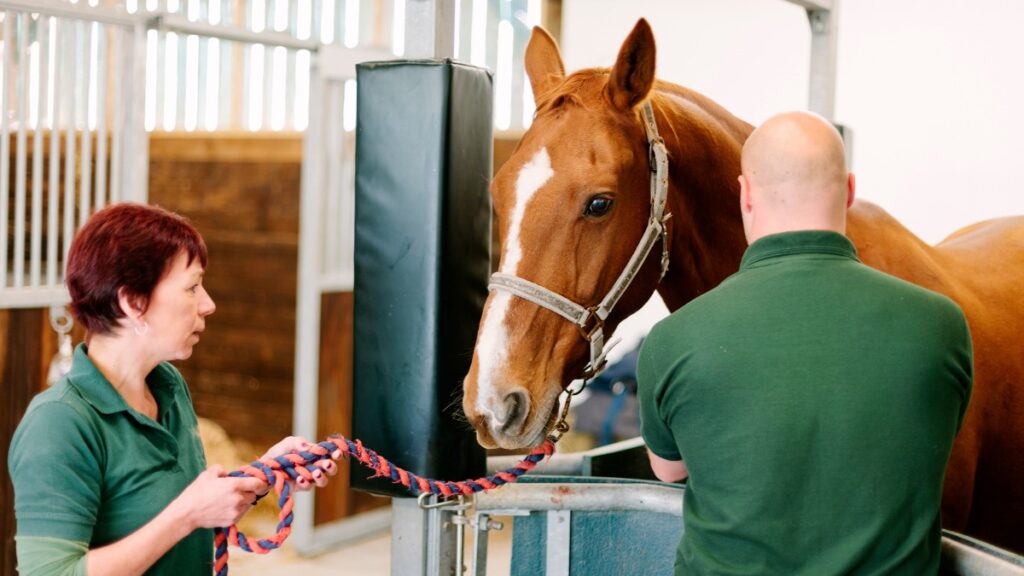
As we look towards the future, ongoing research, and emerging technologies hold great promise for transforming the management of protozoal diseases in horses. These advancements are poised to deliver more effective, targeted, and sustainable solutions.
Emerging Research
- Cutting-edge Studies in Equine Protozoal Disease Management:
- Research is increasingly focusing on understanding the molecular and genetic basis of protozoal diseases. Studies exploring the genome of protozoa like Sarcocystis neurona aim to identify potential targets for new treatments or vaccines.
- Another area of interest is the host’s response to protozoal infection. Insights into the immune response of horses to protozoa can inform the development of immunotherapies and more effective treatment protocols.
- Innovations in Vaccine Research and Genetic Studies:
- Vaccine research for protozoal diseases in horses is a field ripe for breakthroughs. Advances in molecular biology and immunology are aiding the development of vaccines that could provide long-term immunity against diseases like EPM.
- Genetic studies focusing on the susceptibility of horses to protozoal infections could lead to breeding programs aimed at enhancing natural resistance to these diseases.
The Future of Equine Protozoal Disease Management
- Predictions for Future Advancements:
- The integration of AI and machine learning in disease diagnosis and treatment is expected to become more prevalent. These technologies can help in early detection of diseases and in predicting the efficacy of treatment regimens.
- Advances in drug delivery systems, such as nanoparticle technology, could improve the efficacy and reduce the side effects of antiprotozoal medications.
- The Potential Impact of Biotechnology and Personalized Medicine:
- Biotechnology holds the potential to revolutionize equine protozoal disease management, especially through genetic engineering and CRISPR technology, which could be used to develop more effective drugs and vaccines.
- Personalized medicine, based on the genetic makeup of individual horses, could lead to more tailored and effective treatment strategies. This approach would consider the unique response of each horse to infections and treatments, optimizing therapeutic outcomes.
The future of equine protozoal disease management is bright, with research and technological advancements paving the way for significant progress. The potential impact of these developments cannot be overstated, as they promise to bring more precise, effective, and less invasive methods of diagnosis, treatment, and prevention. As we continue to advance in our understanding and capabilities, the prospect of better, more effective management of protozoal diseases in horses becomes increasingly attainable.
Conclusion
The journey through the complex world of equine protozoal diseases reveals a landscape marked by significant advancements and promising prospects. Current developments in diagnosing, treating, and preventing these diseases have dramatically improved our ability to manage their impact on equine health. From the evolution of traditional treatment protocols to cutting-edge research in vaccine development and genetic studies, each stride forward reflects a deepening understanding of these intricate diseases.
The role of modern diagnostic techniques, including molecular diagnostics and advanced imaging, has been pivotal in the early and accurate detection of protozoal infections in horses. Treatment approaches have evolved, with new drug therapies and innovative management strategies improving the outcomes for affected horses. Meanwhile, preventive measures, especially in biosecurity and environmental management, remain fundamental in reducing the incidence of these diseases.
Looking to the future, the potential of emerging research and technologies in reshaping equine protozoal disease management is immense. The promise of vaccine development, the application of biotechnology, and the advent of personalized medicine approaches hold exciting possibilities for more targeted and effective interventions. These advancements not only aim to enhance the treatment and prevention of protozoal diseases but also strive to improve the overall quality of life for horses.
The importance of continued research and collaboration across various scientific disciplines cannot be overstated. It is through these concerted efforts that we can expect to see further breakthroughs and innovations. Veterinary professionals, researchers, and horse owners must continue to work together, sharing knowledge and experiences, to advance the field of equine health.
In conclusion, while challenges remain, the advancements in understanding and managing equine protozoal diseases paint an optimistic picture. With ongoing research, collaboration, and the integration of new technologies and approaches, the future of equine health, particularly in combating protozoal diseases, looks brighter and more promising than ever.
Stay updated and join our community on:
- Facebook: Follow us on Facebook
- Twitter: Stay connected on Twitter
- Instagram: Explore with us on Instagram
- YouTube: Watch our latest videos
- Common Protozoal Diseases in Horses and Their Impact:
